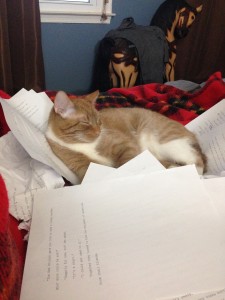Writers (and creative people in general) face a unique set of challenges in a society that generally doesn’t value what we do.
A few months back, I was at a party with my wife, hanging out, busily meeting people, chatting, etc. We were about a month into our stay in New Zealand. I happened to meet a woman and soon established that she was from Colorado, married to a New Zealander.
She asked me, “What do you do for work?”
“I’m a writer,” I said, having already established with several people at the party that I have five books in print and have been freelance writing for about sixteen years.
“So you don’t, then,” she said flippantly.
I then excused myself in favor of more intelligent conversation.
This stranger’s attitude is bad enough, but it’s even worse if it comes from a writer’s family, and the closer the family member is, the more painful the attitude. You can put up with Uncle Earl at family reunions asking you when you’re going to get a job, but when it’s your mother asking you when you’re going to stop drawing “those funny books,” or your significant other whining about having so little time to spend with him/her and that you’d rather be alone doing that weird thing you do, that’s when it chafes your skin away and ultimately grinds all the way to the bone.
When there are so many out there for whom the above is a daily battle, I know I’m fortunate to have a significant other who loves the fact that I’m a writer. She loves that I can do what I do (and I used that ability shamelessly to woo her). She whole-heartedly believes it to be a worthy endeavor, deserving of the same monetary respect we routinely pay to plumbers, mechanics, lawyers, doctors, etc., even though she cannot fathom how I put up with the rejection, uncertainty, and angst associated with it.
But she has this strange, unfathomable quirk that she likes hanging out with me. And ditto my stepdaughter. It’s like they think I should have meals with them. Or go places with them. Or take them to school. It’s like they can’t tell when I’m in the depths of the Zone, that elusive, mythical place where the magic happens, that place that’s so fragile a simple knock on the door makes it evaporate like the barest morning dew, leaving the writer clenching his fists in frustration.
“What is it?”
“Um…”
“Is there blood?”
“Well, no, but…”
“Is there a fire?”
“No, but…”
“Then why for hast thou knocked upon this portal?”
“There’s a spider.”
Sigh.
This was a constant struggle when the girlfriend became the cohabitating partner a few years back. Writers are a special kind of introvert, in that their very profession demands that they spend great swaths of time alone. These swaths of time are in direct conflict with the time required to maintain the bonds of love. Tons of difficult conversations later, we have reached a détente, and the bottom line, despite endless whinging on my part, is that the problem is not intrusions or distractions or interruptions.
The problem is always me. More on that in a minute.
It’s too easy for that infinitely fragile creative butterfly that we imagine is within us to be crushed or driven away by a knock on the door, a text, a phone call, a clearing of the throat; so even when your significant other is amazing and supportive, wants your to feel fulfilled, wants you to reside forevermore in the afterglow of creation like you’ve just had cosmically awesome sex, you push for more room for our art. It’s art, dammit!
One of the worst feelings in the world is when you’re in the rush of creation, and you know it’s gold, and you can feel your fingers brushing through the river of the divine–and someone comes into your space and requests your attention. A knock. A text. A phone call. A clearing of the throat. Flow: destroyed. Muse: fled.
And they have no idea what they just did to you.
I was in a seminar a couple of years ago listening to a panel discussion on productivity for writers. At the time, the difficult discussions mentioned above were ongoing. One of the panelists was a successful, best-selling novelist who’s been writing fiction full-time for over twenty years. He mentioned that work interruptions were still a point of contention between him and his wife. “Well, surely you have time to run this errand for me. It’s not like you keep set hours or have a boss who’ll fire you.”
Hope that my own struggles would ever be resolved began to evaporate.
After such discussions with my family, there is one thing, however, that I keep coming back to in my own reflections.
Boundaries. Staking out a little patch of creative space, internally or externally. A room. An office. A table at your favorite coffee shop. When you’re in that space, you’re working, the same as if you were on the production line at the factory. And you must defend those boundaries with fire and swords because the biggest enemy who will assail those walls is you.
This can be a difficult thing to do. Who likes telling their children ‘no’? How do you tell your friends that you can’t go out because you’ve got a writing schedule? How do you tell your partner who’s had a rough day that they can’t just barge in and start venting?
Once you’ve established your boundaries, those who truly support you will honor them. Those who don’t honor those boundaries don’t truly support you, a circumstance that might require more drastic measures (but that’s a topic for another time).
But here’s the really hard part. (What, you mean this writing thing isn’t difficult enough?? Screw this! I’m gonna be a janitor! I need a raise!)
The problem, as I said above, is not them. It’s not outsiders horning in on your creative time. A writer’s worst enemy, worst time-destroyer, worst butterfly-slaughterer, is always himself.
Yeah, you can run that errand. Yeah, you can pick the kids up from the pool on that Saturday afternoon. Yeah, you can go to the recital. Yeah, we can see that movie because we haven’t had a night out in weeks. Yeah, you can come and kill that spider. Yeah, you can surf social media, or check email, or obsess about your sales numbers, or spend hours marketing to blogs who have all of twenty regular readers, or braid your beard, or weave pocket lint into a picture frame, or shave the cat, or…
Any of these things is easier that sitting down to write.
So what then is the answer?
There ain’t one, kids.
Except to sit down and write anyway. Find the reason. Find the space. Make your peace with the struggle.
About the Author: Travis Heermann

 Travis Heermann’s latest novel Spirit of the Ronin, was published in June, 2015.
Travis Heermann’s latest novel Spirit of the Ronin, was published in June, 2015.
Freelance writer, novelist, award-winning screenwriter, editor, poker player, poet, biker, roustabout, he is a graduate of the Odyssey Writing Workshop and the author of Death Wind (co-authored with Jim Pinto), The Ronin Trilogy, The Wild Boys, and Rogues of the Black Fury, plus short fiction pieces in anthologies and magazines such as Perihelion SF, Fiction River, Historical Lovecraft, and Cemetery Dance’s Shivers VII. As a freelance writer, he has produced a metric ton of role-playing game work both in print and online, including content for the Firefly Roleplaying Game, Legend of Five Rings, d20 System, and EVE Online.
He lives in New Zealand with a couple of lovely ladies and more Middle Earth souvenirs than is reasonable.
You can find him on…





